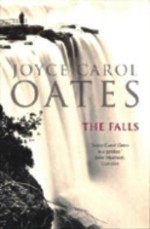|
Book
Review
The "Suicide's Paradise"
By
1900, according to an epigraph in Joyce Carol Oates's latest
novel, Niagara Falls had become known as "Suicide's Paradise".
Set in the region of upstate New York where Oates grew up,
The Falls opens in the 1950s with a Presbyterian reverend
leaping to his death after the first night of his marriage.
Yet, as the novel explores the ironies of an Eden despoiled
not only by banal commodification, but by unchecked industrial
expansion, the Suicide's Paradise becomes emblematic of a
greater disaster: a country poisoning itself and its future.
Based partly on facts about the local "Love Canal"
pollution scandal, and those who fought to expose it in the
60s and 70s, The Falls seeks to evoke a mythological battle
between the will to self-annihilation and the impulse to conserve
life.
It is
a family saga centred on Ariah Erskine, the bride turned widow
of the repressed homosexual clergyman whose failed ambition
was to reconcile evolution with Genesis. Ariah, a music teacher
whose sense of being damned has a "fatal smugness",
is soon betrothed to Dirk Burnaby, a lawyer gilded by wealth
and good looks, with whom she has three children. Yet, just
as the 1850s saw a boom in tourist development, the 1950s
were of rampant industrial exploitation. By 1970 the region
was to have the highest concentration of chemical factories
in the US. Burnaby is drawn into championing a class action
suit against the polluters by a "woman in black",
whose three-year-old daughter died of leukaemia and whose
son's schoolyard oozes black waste.
The
Falls
Maya Jaggi
 The
attorney uncovers decades of hazardous dumping in the open
ditch of "Love Canal" - some of it radioactive from
military waste in the 40s - with poisoned land sold to the
board of education "for a dollar". As his marriage
falters, his campaign collides with powerful interests that
fear a threat to the tourist appeal of the falls, resulting
in his death in an "accident". The
attorney uncovers decades of hazardous dumping in the open
ditch of "Love Canal" - some of it radioactive from
military waste in the 40s - with poisoned land sold to the
board of education "for a dollar". As his marriage
falters, his campaign collides with powerful interests that
fear a threat to the tourist appeal of the falls, resulting
in his death in an "accident".
After
an interval of 15 years, the story shifts to his grown-up
children, Chandler, Royall and Juliet. They share a "wilful
self-destructiveness" born of a sense of shame about
a man their mother refuses to speak of. As they tell her,
"you cheated us of grief". Each investigates their
father's past. Another generation of lawyers, which succeeds
in the late 70s where Burnaby failed, honours him as a pioneer.
But his children must first turn away from the self-destructive
temptation of revenge.
The treacherous
falls are powerfully evoked. There are engaging vignettes,
such as that of Burnaby's mother, permanently veiled after
botched plastic surgery. But Royall's graveyard seduction
by the woman in black reads like a plot device from the more
vapid reaches of magical realism, while a corrupt cop's descent
into syphilis-induced dementia has the force of limp wishful
thinking.
Oates
has said she veers between an embittered Swiftian irony about
humankind, and idealism. Here, unselfishly decent men contest
Ariah's pessimism and inward-looking isolationism ("I
have to protect my own children. They come first, and - nothing
comes second!"). Yet Oates fails to shed much light on
Burnaby beyond the media clichés spouted at his belated
memorial, of his being a "crusading idealist", a
hero "tragically ahead of his time". The novel's
strained memorialising creates a hectoring tone, as in the
intrusive authorial voice behind Ariah's aside: "Vindication,
validation, redemption, and so forth. Sixteen years too late."
Oates's
finest work has arguably been in the short story, and there
are compelling shorter fictions embedded in this tome. But
the transitions are uneasy, as between Ariah's cursed honeymoon
and the Hollywood conventions of the small man (or woman)
battling with big business against the odds: the gothic meets
Erin Brockovich. Propelled by a succession of taut but tenuously
linked mysteries and a flair for the minutiae of character,
The Falls is often a good read but scarcely a great novel.
This
review was first published in The Guardian
Copyright
(R) thedailystar.net 2004
|
